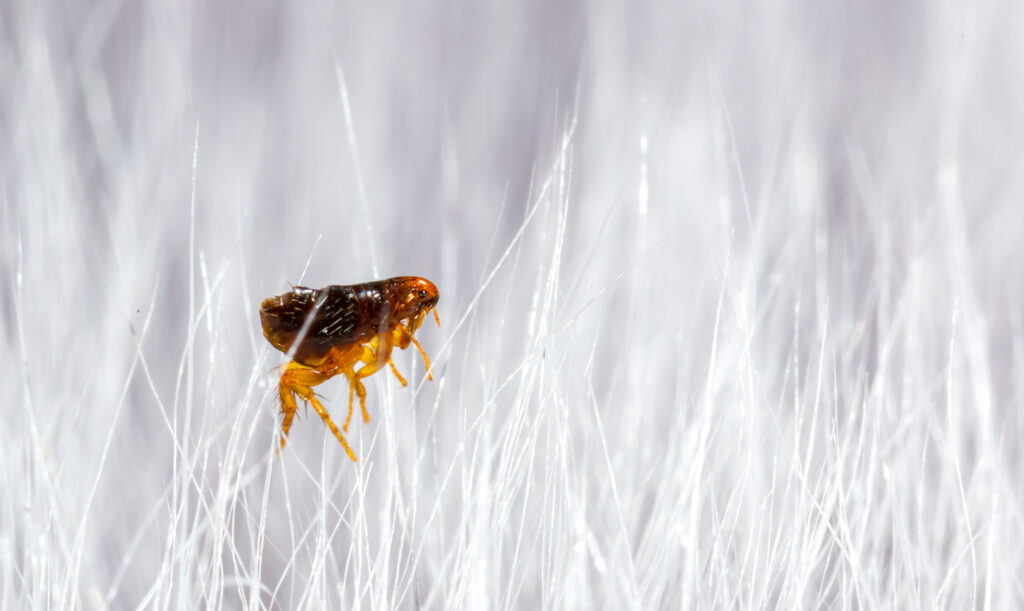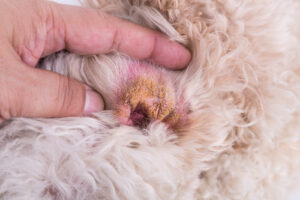As we navigate the colder months in Huntington, NY, many pet owners often wonder about the presence and threat of fleas during winter. This article will shed some light on whether fleas can survive the winter and how this impacts your beloved pets (and your home!). We’ll explore the flea life cycle, the risks they can pose even in colder weather, and the steps you can take to protect your pets year-round. For more detailed information or to schedule an appointment, contact Dix Hills Animal Hospital at (631) 271-8383.
Are Fleas a Threat in Winter?
When temperatures drop, it’s a common belief that fleas are no longer a concern. However, these tiny pests are more resilient than you might think. Even in colder climates, fleas can survive and continue to pose a threat to our pets. Understanding how they manage this can help us better protect our four-legged family members.
The Flea Life Cycle: A Winter Perspective
Fleas are not just a summertime nuisance; they are a year-round concern for pet owners, especially during the winter months. Understanding the flea life cycle can help us see why these pests are a problem even when it’s cold outside.
How Fleas Adapt to Cold Seasons
Fleas have a complex life cycle consisting of four stages: egg, larva, pupa, and adult. This cycle can speed up or slow down depending on environmental conditions. In winter, when outdoor temperatures are low, the life cycle of fleas can significantly slow down. However, it doesn’t come to a complete halt.
Flea Eggs and Larvae in Winter
The beginning stages of a flea’s life – the egg and larval stages – are particularly concerning in the colder months. Flea eggs are laid by the adult female on the host (your pet) but often fall off into the environment. These eggs can then end up in various areas of your home, like carpets, bedding, and floor cracks. In a warm indoor environment, these eggs can hatch into larvae.
Larvae avoid light and burrow deep into carpets, furniture, or cracks in wood flooring. Here, they feed on organic debris and develop into pupae. The colder temperatures outside do not affect these larvae much, as the warmth of your home provides a perfect breeding ground.
Flea Pupae: The Resilient Stage
The pupal stage is the most resilient in the flea life cycle. The pupae are encased in a cocoon and can remain dormant for weeks or even months, waiting for the right conditions to emerge as adult fleas. This means that fleas can essentially “overwinter” in your home in the pupal stage. The warmth and humidity of a centrally heated home during winter create an ideal environment for these pupae to eventually hatch into adult fleas.
The Emergence of Adult Fleas
The final stage is the adult flea, which is most concerning for pet owners. Adult fleas emerge from the pupae when they detect a host is near – this can be triggered by vibrations, heat, and carbon dioxide, all of which are abundantly present in a home environment. Once they emerge, they seek out a host (like your pet) and begin the cycle anew, laying eggs within just a few days of their first blood meal.
The Importance of Year-Round Flea Protection
The adaptability of fleas means that skipping flea protection during winter can leave your pets vulnerable. Continuous flea control is a key strategy in ensuring your pets are safe from these pests throughout the year.
It’s important to choose flea protection products that are effective and safe for your pets. Consult with your veterinarian at Dix Hills Animal Hospital to make sure you’re using the best options available for your pet’s needs.
Preventing Flea Infestations in Winter
While a flea infestation in the middle of winter seems unlikely, preventive steps can further reduce the risk they pose to your pets and you.
Regular Home Cleaning
Maintaining a clean home environment is a major step in preventing flea infestations. Regular vacuuming and washing of pet bedding can greatly reduce the risk of fleas surviving and multiplying indoors.
Checking Your Pets Regularly
Regularly inspecting your pets for fleas, especially after they’ve been outside, is another important preventative measure. Early detection can prevent a full-blown infestation.
Contact Us for More Guidance on Flea Prevention
If you’re still unsure about the best ways to protect your pets from fleas or suspect an infestation, it’s always best to seek professional help. Contact Dix Hills Animal Hospital for guidance and treatment options at (631) 271-8383.





